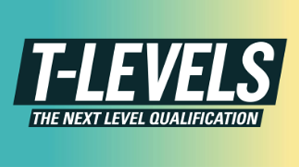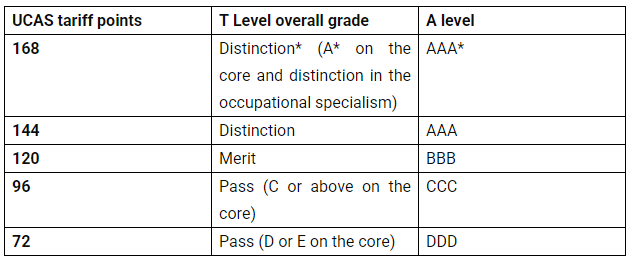



T - Levels

What is a T-Level?
T Levels are new 2-year courses which are taken after GCSEs and are broadly equivalent in size to three A Levels. Launched in September 2020, these courses have been developed in collaboration with employers and education providers so that the content meets the needs of industry and prepares students for entry into skilled employment, an apprenticeship or related technical study through further or higher education. T Levels offer students practical and knowledge-based learning at a school or college and on-the-job experience through an industry placement of at least 315 hours – approximately 45 days. The courses are available at selected colleges, and other providers.
How T Levels will work with other qualifications?
T Levels will become one of the main choices for students after GCSEs alongside apprenticeships and A-levels. The Department for Education (DfE) is streamlining and improving the quality of the post-16 level 3 qualifications system. They are strengthening progression pathways, creating clearly defined academic and technical routes with high quality qualifications leading to further study, and/or skilled employment. This will help students to make good choices and see more easily how their study will help them to progress.
T Levels differ from an apprenticeship. T Levels prepare students for work, further training, or further study. An apprenticeship is typically 80% on-the-job and 20% in the classroom and is more suited to those who want to earn a wage and learn at the same time and are ready to enter the workforce at age 16.
Structure of a T Level
T Levels require students to undertake both a technical qualification and an industry placement with an employer. Students are also required to work towards the attainment of Maths and English if they have not already achieved grade 4 at GCSE, as students do on other 16 to 19 programmes.
Transition programme
The T Level transition programme is a 1-year post-GCSE study programme designed to support progression to, and success on, a T Level. It is aimed at students who would like to do a T Level but would benefit from additional preparation and support before starting one. The programme gives students the opportunity to study technical content aligned to T Levels and develop their English, maths and digital skills, alongside work experience and personal development.
Industry placements
Every T Level includes an industry placement with an employer focused on developing the practical and technical skills required for the occupation. These will last a minimum of 45 days but can last longer. Employers can offer industry placements as a block, day release or a mix of these, and can discuss sharing part of the placement with another employer if necessary.
Grading and certification
Students who complete their T Level get a nationally recognised certificate which shows their overall grade and a breakdown of what they have achieved.
The T Level certificate includes:
- an overall grade for the T Level, shown as pass, merit, distinction or distinction*
- a separate grade for the core component, using A* to E
- a separate grade for each occupational specialism, shown as pass, merit or distinction
It also confirms that the student has:
- completed the industry placement
- met any additional mandatory requirements
A student’s overall T Level grade is worked out from the grades they achieved on the core component and the occupational specialism(s).
Entry to higher education and UCAS tariff points
T Levels provide several progression options for students, including:
- skilled employment
- an apprenticeship
- higher education
To help T Level students’ progress into higher education, UCAS tariff points are allocated to T Levels.
UCAS points are allocated to the overall T Level grade. Students must achieve at least an overall pass grade to receive UCAS points.
